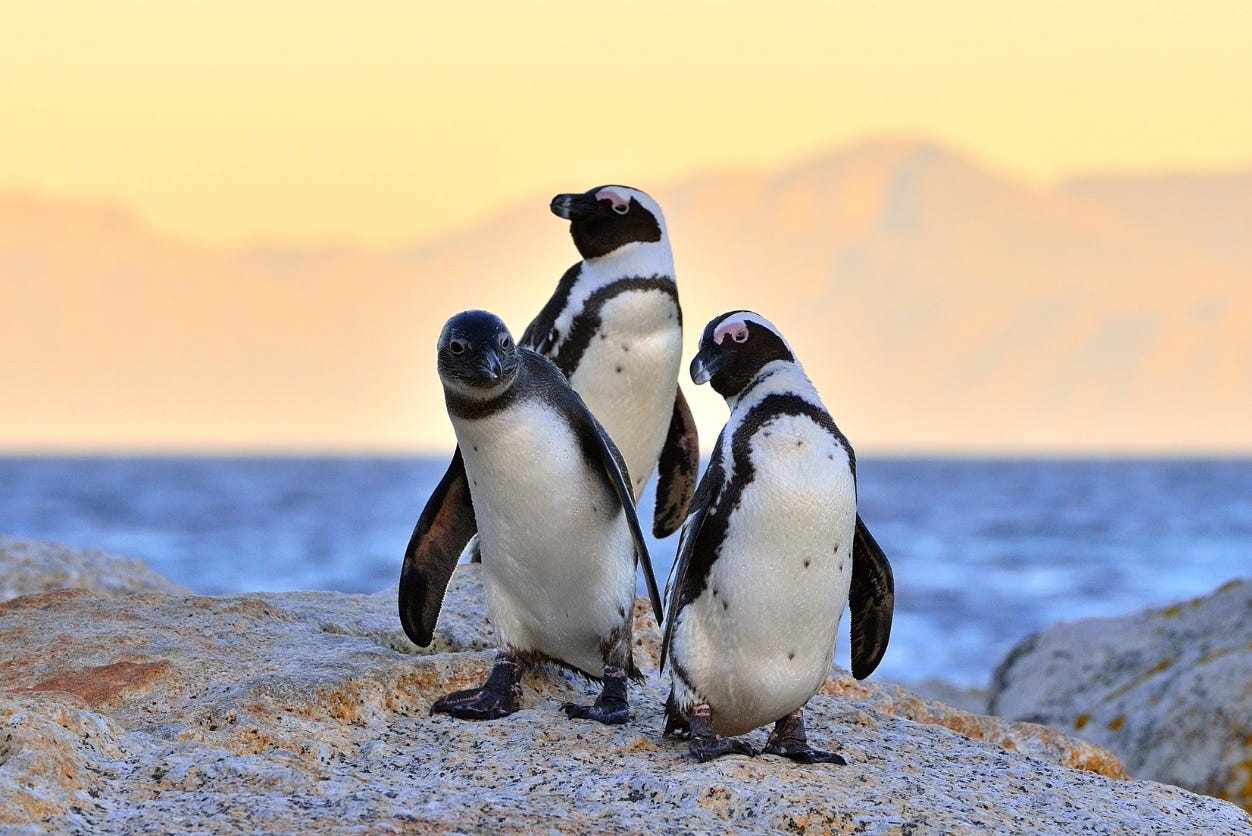Good News: Issue 12
South Africa's efforts to save penguins, Medicine Hat's new solar farm, Switzerland’s railway solar project, Ireland Rail's water refill stations, and paint that 'sweats'
Hello Friends,
I hope you’re having a fabulous summer! After a week away at the cottage with family, I’m back in the city — and my home is a construction zone. We’re building a net zero laneway suite (which I will be writing about), and this week the crew is trenching for water lines. Luckily we have lots of great libraries in Toronto, where I can continue to work on the Greener Good without the noise of demolition. I even had a chance to book an AV room to record the intro to my upcoming podcast (!!!) — which I will be launching this fall. Tonight I’m going to be photographing a Common Nighthawk family for an upcoming story on how this incredible species relies on human infrastructure (rooftops) for nesting habitat. Needless to say, I’m busy — in a good way. Thankfully I have had some help from a friend and former colleague Katie, who summarized this week’s Good News stories. Thanks Katie!!!
Medicine Hat is turning a former industrial site into a major solar park
The city of Medicine Hat, Alberta, is repurposing a former industrial site into the Saamis Solar Park — a 325-megawatt solar project that will provide clean, renewable electricity to the region. With Medicine Hat boasting 330 days of sunshine a year — more than any other Canadian city — the location couldn’t be any better.
Once complete, this will be one of the largest solar installations in Canada, supplying power to thousands of homes while reducing carbon emissions. The project highlights a growing trend of transforming underused industrial land into productive, climate-positive infrastructure.
South Africa is creating no-fishing zones to save penguins
A new legal agreement will create no-fishing zones within a 20-kilometer radius around six of South Africa’s penguin colonies — including Robben Island near Cape Town and Bird Island near Gqeberha. The African penguin population is in steep decline, with fewer than 10,000 breeding pairs left. Overfishing is largely responsible for the decline, and if action isn’t taken, the species could be extinct in the wild by 2035.
The legal settlement was reached after environmental groups SANCCOB and BirdLife South Africa sued the government in May 2024, arguing that the previous environment minister failed to create meaningful bird protections. After taking office in July, South Africa’s new environment minister, Dion George, pushed for an out-of-court agreement. This protection will last for 10 years, with a review after six.
Swiss project is turning railways into solar farms
Swiss startup Sun-Ways is moving full steam ahead to install solar panels between railway tracks, starting with a test site in Neuchâtel. Installed by a custom maintenance train, the system can deploy panels quickly and with minimal disruption. (And no need to convince homeowners to install solar on the roof!)
If scaled across Switzerland’s rail network, the project could meet up to 30% of the country’s public transport electricity needs and significantly cut CO₂ emissions — turning existing rail infrastructure into clean energy lifelines.
This paint ‘sweats’ to cool homes naturally
Researchers in Singapore have developed a cement‑based paint called CCP‑30 that mimics perspiration to cool buildings — even in humid climates. It combines solar reflection, radiative cooling, and evaporative cooling, releasing absorbed heat as it slowly evaporates water stored in its porous structure. Tests on small houses showed it cut electricity use from air conditioning by 30–40 %, while maintaining high reflectivity (88–92 %) and staying white over two years of sun and rain. It captures water from rain or humid air, making it self‑sustaining, and especially suited for dense, warm cities combating urban heat islands.
Irish Rail launches water refill stations to cut plastic waste
Irish Rail has begun installing free water bottle refill stations at major train stops, starting with Dublin’s Malahide station. The rollout, in partnership with Ecofil, will expand to other cities in the coming months.
The goal is to reduce single-use plastic by making filtered, UV-cleaned water easily accessible to commuters. Time to say Sláinte with your Stanley!
Yours for the Greener Good,
Brett



